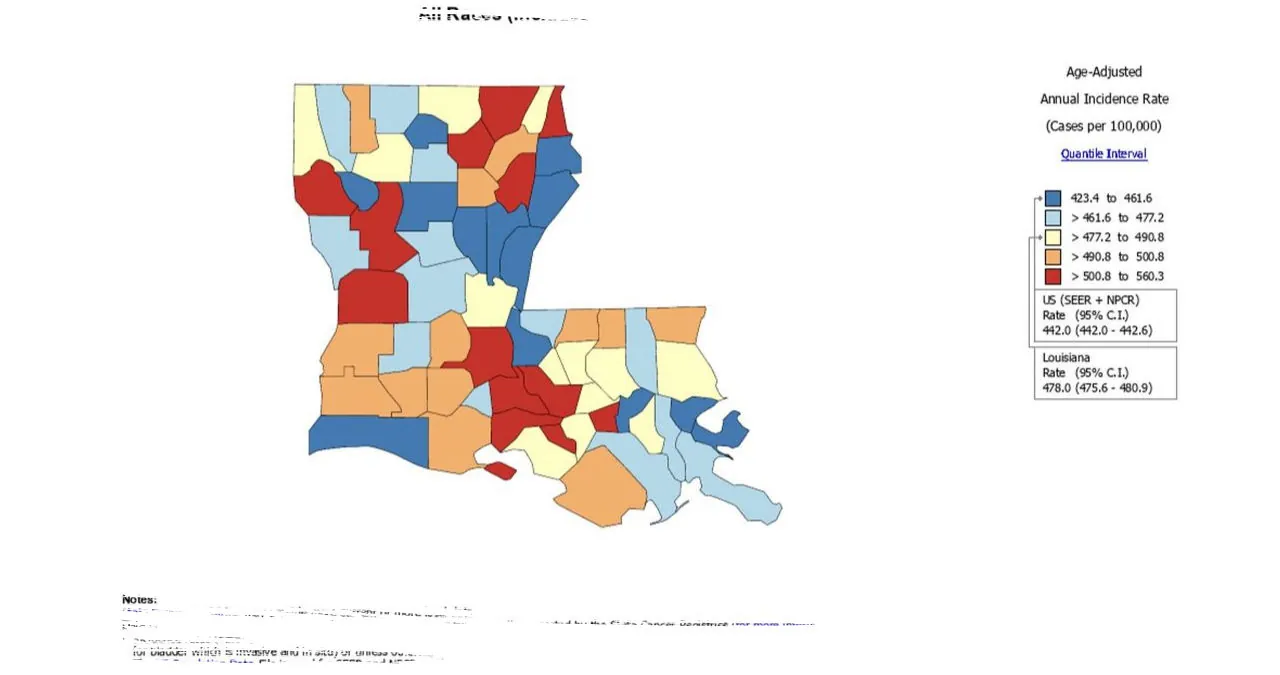This Louisiana Parish Has the Highest Cancer Rate in the State (You Won’t Believe!)
Breast Cancer Awareness Month is observed in October, serving as a powerful reminder of the ongoing battle against this devastating illness.
Cancer is a condition characterized by the uncontrolled growth of abnormal cells in the body. These cells, referred to as cancer cells, multiply and spread rapidly, forming masses or tumors that can interfere with the normal functioning of organs and tissues.
Prostate cancer is the most prevalent form of cancer in Louisiana. As per the latest data from the CDC, there have been 4,970 new cases reported in 2023.
Cancer can manifest in various parts of the body and has the potential to spread to other regions, a phenomenon referred to as metastasis. It encompasses a wide array of types, such as breast, lung, prostate, and leukemia, each exhibiting distinct attributes and necessitating specific treatments. Cancer poses a substantial risk to health, often requiring medical interventions like surgery, chemotherapy, radiation therapy, or targeted therapies to effectively manage or eliminate it.
Cancer awareness is a crucial aspect of our global battle against this relentless disease. It serves as a symbol of hope, bringing together individuals, communities, and organizations in a united endeavor to minimize its devastating consequences. Recognizing the significance of cancer awareness entails acknowledging its numerous advantages.
Cancer awareness goes beyond the individual and encompasses larger public health issues as well. It involves recognizing the impact of lifestyle choices, environmental factors, and healthcare disparities on cancer rates. By raising awareness, we can start important conversations about these interconnected issues, fostering healthier communities and a more proactive approach to cancer prevention.
Iberville Parish Has the Highest Rate of Cancer in Louisiana
Iberville Parish has the highest overall rate of cancer per capita, with a rough five-year average of 560.3 per 100,000, according to the CDC’s state cancer profiles database.
Iberville Parish faces a significant challenge as it is located in an area known as “Cancer Alley.” This term was coined during a study conducted on health concerns in the lower Mississippi River region, specifically south of Baton Rouge. The rapid expansion of petrochemical plants in the area has raised suspicions about their potential contribution to the problem.
Iberville and St. James Parishes, located in that area, are among the top ten areas in the state with the highest cancer rates. However, the northeast corner of the state also has a significant presence on this list. East Carroll (2), Morehouse (4), and Franklin (6) Parishes are all well above the state and national averages.
Where Is Lafayette Parish?
Acadiana, the vibrant core of the region, is demonstrating a relatively favorable performance compared to other parts of the state, ranking 50th out of 64 parishes. Interestingly, Lafayette Parish stands out by securing positions within the top 20 for breast cancer (13th) and prostate cancer (19th). Encouragingly, in terms of lung cancer, Lafayette takes the 56th spot out of 64 parishes in the state.
The Importance of Cancer Screening
Cancer screening plays a crucial role in detecting and preventing this destructive disease at an early stage. It enables healthcare professionals to identify cancer in its most treatable form, often before any symptoms manifest.
Timely screening plays a crucial role in increasing the likelihood of successful treatment and survival. Additionally, regular screenings can effectively identify individuals who are at a higher risk of developing cancer due to genetic factors or lifestyle choices. This allows for the implementation of personalized prevention strategies. By detecting cancer at an early stage, screening not only saves lives but also alleviates the emotional, physical, and financial burdens associated with advanced-stage cancer for patients, their families, and healthcare systems. Consequently, cancer screening serves as a fundamental pillar of public health and overall well-being.
Read More:







